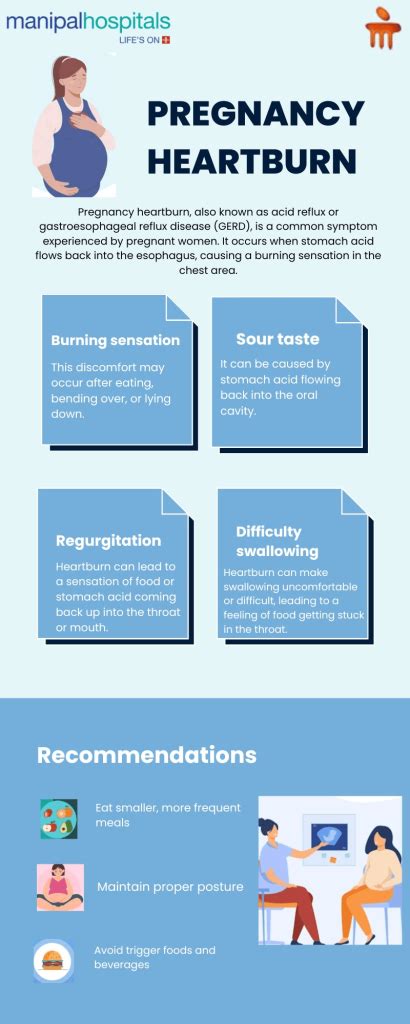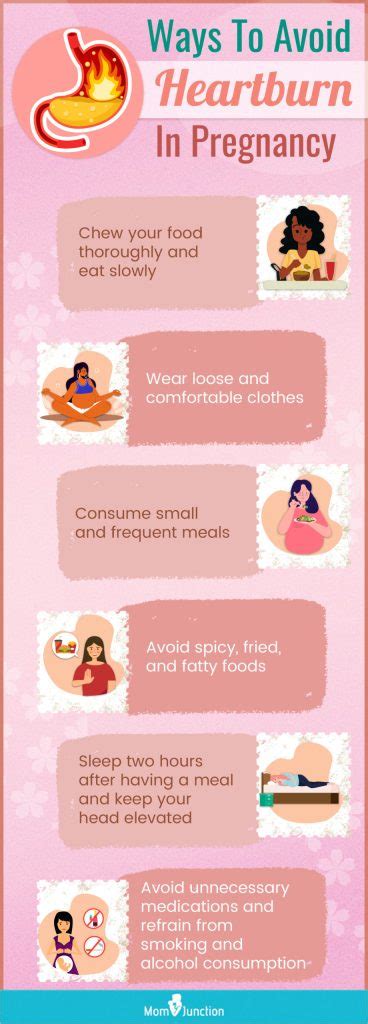Intro
During pregnancy, women experience a multitude of physical changes that can affect their overall health and well-being. One common issue that many pregnant women face is acid reflux, also known as gastroesophageal reflux disease (GERD). Acid reflux occurs when stomach acid flows back up into the esophagus, causing a burning sensation in the chest and throat. This condition can be uncomfortable and even painful, especially during pregnancy.
Pregnancy hormones, such as progesterone, can cause the muscles in the digestive tract to relax, leading to a decrease in the lower esophageal sphincter's (LES) ability to prevent stomach acid from flowing back up into the esophagus. Additionally, the growing uterus can put pressure on the stomach, causing stomach acid to be pushed up into the esophagus. As a result, many pregnant women experience acid reflux, especially during the second and third trimesters.
Acid reflux can be a significant concern for pregnant women, as it can disrupt their daily lives and make it difficult to get a good night's sleep. Furthermore, if left untreated, acid reflux can lead to more serious complications, such as esophagitis, stricture, and even respiratory problems. Therefore, it is essential for pregnant women to understand the causes, symptoms, and treatment options for acid reflux, as well as how to manage the condition and prevent it from interfering with their daily lives.
Understanding Acid Reflux During Pregnancy

Acid reflux during pregnancy is often caused by a combination of hormonal and physical changes. As mentioned earlier, the hormone progesterone can cause the muscles in the digestive tract to relax, leading to a decrease in the LES's ability to prevent stomach acid from flowing back up into the esophagus. Additionally, the growing uterus can put pressure on the stomach, causing stomach acid to be pushed up into the esophagus. Other factors that can contribute to acid reflux during pregnancy include eating large or heavy meals, lying down after eating, and consuming trigger foods such as citrus fruits, chocolate, and spicy or fatty foods.
Symptoms of Acid Reflux During Pregnancy
The symptoms of acid reflux during pregnancy can vary from woman to woman, but common symptoms include: * A burning sensation in the chest and throat * Regurgitation of food or sour liquid * Difficulty swallowing * Chest pain or discomfort * Bloating and gas * Nausea and vomitingTreatment Options for Acid Reflux During Pregnancy

Fortunately, there are several treatment options available for acid reflux during pregnancy. The goal of treatment is to alleviate symptoms, prevent complications, and improve quality of life. Some common treatment options include:
- Lifestyle modifications: Eating smaller, more frequent meals, avoiding trigger foods, and avoiding lying down after eating can help alleviate symptoms.
- Over-the-counter antacids: Antacids such as Tums, Rolaids, and Mylanta can help neutralize stomach acid and provide quick relief.
- Histamine-2 (H2) blockers: H2 blockers such as ranitidine (Zantac) and famotidine (Pepcid) can help reduce acid production in the stomach.
- Proton pump inhibitors (PPIs): PPIs such as omeprazole (Prilosec) and lansoprazole (Prevacid) can help block the production of acid in the stomach.
Dietary Changes to Manage Acid Reflux During Pregnancy
Making dietary changes can help alleviate symptoms of acid reflux during pregnancy. Some tips include: * Eating smaller, more frequent meals to reduce pressure on the stomach * Avoiding trigger foods such as citrus fruits, chocolate, and spicy or fatty foods * Avoiding lying down after eating * Avoiding tight clothing that can put pressure on the stomach * Drinking plenty of water to stay hydratedHome Remedies for Acid Reflux During Pregnancy

In addition to medical treatment, there are several home remedies that can help alleviate symptoms of acid reflux during pregnancy. Some home remedies include:
- Ginger: Ginger has natural anti-inflammatory properties that can help reduce inflammation and alleviate symptoms.
- Aloe vera: Aloe vera can help soothe the esophagus and reduce inflammation.
- Chamomile tea: Chamomile tea can help calm the digestive system and reduce stress.
- Elevating the head of the bed: Elevating the head of the bed by 6-8 inches can help prevent stomach acid from flowing back up into the esophagus.
Preventing Acid Reflux During Pregnancy
Preventing acid reflux during pregnancy can be challenging, but there are several steps that can be taken to reduce the risk. Some tips include: * Maintaining a healthy weight * Eating a balanced diet * Avoiding trigger foods * Avoiding lying down after eating * Managing stressComplications of Untreated Acid Reflux During Pregnancy

If left untreated, acid reflux during pregnancy can lead to several complications, including:
- Esophagitis: Inflammation of the esophagus
- Stricture: Narrowing of the esophagus
- Respiratory problems: Asthma, pneumonia, and other respiratory problems
- Poor nutrition: Malabsorption of nutrients can lead to poor nutrition and weight loss
Managing Acid Reflux During Pregnancy
Managing acid reflux during pregnancy requires a comprehensive approach that includes lifestyle modifications, dietary changes, and medical treatment. Some tips include: * Keeping a food diary to track trigger foods * Avoiding lying down after eating * Eating smaller, more frequent meals * Avoiding tight clothing * Staying hydratedConclusion and Next Steps

In conclusion, acid reflux during pregnancy is a common condition that can be managed with lifestyle modifications, dietary changes, and medical treatment. By understanding the causes, symptoms, and treatment options, pregnant women can take steps to alleviate symptoms and prevent complications. If you are experiencing symptoms of acid reflux during pregnancy, it is essential to speak with your healthcare provider to develop a personalized treatment plan.
What are the symptoms of acid reflux during pregnancy?
+The symptoms of acid reflux during pregnancy can vary from woman to woman, but common symptoms include a burning sensation in the chest and throat, regurgitation of food or sour liquid, difficulty swallowing, chest pain or discomfort, bloating and gas, and nausea and vomiting.
How can I manage acid reflux during pregnancy?
+Managing acid reflux during pregnancy requires a comprehensive approach that includes lifestyle modifications, dietary changes, and medical treatment. Some tips include keeping a food diary to track trigger foods, avoiding lying down after eating, eating smaller, more frequent meals, avoiding tight clothing, and staying hydrated.
What are the complications of untreated acid reflux during pregnancy?
+If left untreated, acid reflux during pregnancy can lead to several complications, including esophagitis, stricture, respiratory problems, and poor nutrition. It is essential to speak with your healthcare provider to develop a personalized treatment plan and prevent these complications.
We hope this article has provided you with valuable information on acid reflux during pregnancy. If you have any questions or concerns, please don't hesitate to reach out to your healthcare provider. Additionally, we encourage you to share this article with friends and family who may be experiencing similar symptoms. By working together, we can help alleviate the discomfort and complications associated with acid reflux during pregnancy.
